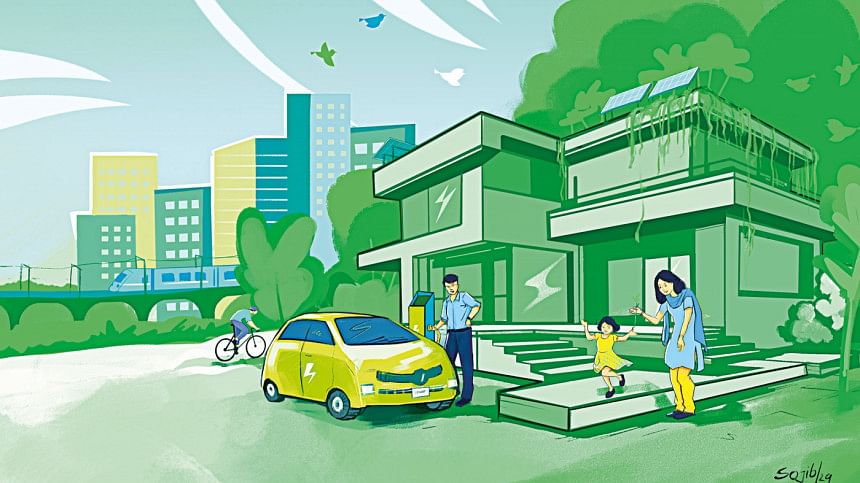Living Green Making Everyday Eco-Friendly

In today's world, living green is no longer just a trend—it's a necessity. With environmental concerns mounting, minimizing our ecological footprint has become imperative. From renewable energy to mindful consumption, every aspect of our lives offers an opportunity to contribute positively to environmental preservation. Join us as we explore the essence of living green and uncover ways to make everyday choices that prioritize the well-being of our planet.
Turning waste into energy
In Bangladesh, the trajectory of rising energy costs intersects with the alarming reality of mounting plastic waste. Dhaka alone generates a staggering 700 tons of plastic waste daily, with only 37% being recycled. However, amidst this challenge lies an opportunity—organic waste such as rice husks or coconut shells holds potential for conversion into electricity or biomass.
Ali Arsalan, the Managing Director of Atiya Consulting Ltd, shares, "We have vast potential in every major city in Bangladesh to begin segregating our daily waste, enabling easy treatment and recycling for various purposes, including energy generation. While government policies play a role, individual action is essential for success. " His company is focused on transforming waste liabilities into energy assets.
According to Syeda Rizwana Hasan, Chief Executive of Bangladesh Environmental Lawyers Association (BELA), we can start understanding our impact on the environment by looking at how much energy and water we use and waste, and whether we prefer local or imported products for our food and clothing. This helps us see how much harm we're causing and what we can do to live more eco-friendly.
We should also think about how much waste we produce and be aware of plastic pollution, especially by avoiding single-use plastics. We can do this by checking if we waste food, if our food is contaminated with chemicals, and by avoiding drinks and foods with chemicals. It's also good to think about growing our own food or buying directly from farmers, and using public transportation instead of driving a car. Lastly, we should get involved in protesting activities that harm the environment, added Syeda Rizwana Hasan.
Sustainable fashion
People of all ages often find themselves buying more clothes than they need, resulting in overstuffed wardrobes. However, adopting a sustainable fashion approach not only benefits the environment but also allows individuals to look stylish by incorporating eco-friendly elements into their wardrobes.
Sustainable fashion is an integral part of a green lifestyle, involving the use of eco-friendly materials such as organic cotton, bamboo and recycled fabrics. Additionally, creating a minimalist wardrobe with versatile, timeless pieces and extending the life of garments through proper washing, repairing, and repurposing are excellent practices for promoting a green lifestyle.
Kumudini Handicrafts, a popular brand, offers many eco-friendly and sustainable products. Notably, Kumudini's clothing line for men, women, and children uses only natural dyes made from various tree parts, including branches, roots, and fruits.
Rafiqul Islam, Head of Operations at Kumudini Handicrafts, proudly notes "Our main goal is to encourage people to choose natural products, which not only protect the environment but also safeguard individuals from skin conditions and cancer caused by chemical dyes in fabrics."
"Never doubt that a small group of thoughtful, committed citizens can change the world; indeed, it's the only thing that ever has."
Home gardening
A popular local organization in Dhaka, Green Savers, promotes home gardening by planting trees in people's homes. According to Ahsan Rony, the founder of Green Savers, home gardening has become very popular in cities over the last 5-10 years. People with rooftop access are using their spaces for gardening and farming. Some create rooftop gardens for beautification and entertainment, while others commit to rooftop farming for fresh vegetables and fruits. Recently, a few individuals have even started earning money by producing and selling fruit saplings and ornamental plants from their rooftops.
"Most city dwellers have developed an understanding of global warming, and their small greening initiatives have led to cultural transformations. Greening has become a part of smart living," said Ahsan Rony. "As a result, senior citizens, newly married couples, office workers, and more are planting trees in their spaces, contributing to the environment in a small but effective way."
When asked how more people can adopt the habit of planting trees, Rony suggested that beginners start with a small pot plant on their desk or reading table. Observing daily changes, such as new leaves or spreading branches, can create a ripple effect, encouraging them to bring more plants into their surroundings. This process fosters empathy for plants, motivating beginners to become true plant lovers.
Avoid plastics
People are more willing to switch to sustainable alternatives when they are made aware of the environmental impact of single-use plastics and are provided with viable options. EcoCutlet, a local brand in Dhaka, offers a diverse range of eco-friendly products, including wooden cutlery and areca leaf plates.
"Our wooden cutlery collection consists of disposable spoons, forks, and knives made from sustainably sourced wood, priced between 2 to 3 Taka, perfect for events and outdoor activities. At the same time, our selection of areca leaf plates includes biodegradable plates, bowls, trays, and food boxes crafted from areca leaves, available in multiple designs and sizes ranging from 4 to 10 inches, priced between 5 to 25 Taka," said Md. Azizul Haque, Co-Founder & CEO, EcoCutlet.
Md. Azizul also mentioned that they are excited to expand their eco-friendly product range with new additions, including 'Jute Stick Straws' as a sustainable alternative to single-use plastic straws, and durable, reusable 'Bamboo Straws.'
They are also introducing more bamboo and clay items, catering to consumers seeking quality, compostable options without sacrificing aesthetics and environmental friendliness.
A mother teaching her children to be responsible consumers can alter the family's behavior, potentially creating a ripple effect that extends to society.
Sustainable food choices
Incorporating green practices into every aspect of our daily lives is crucial, and making sustainable food choices is no exception. People need to become more mindful of the food they consume and its impact on the environment. One significant way to do this is by reducing meat and dairy consumption and embracing plant-based diets, which offer environmental benefits.
Moreover, home gardening provides an excellent opportunity to grow your own vegetables, herbs, and fruits, thereby reducing reliance on commercially grown produce. Additionally, minimizing food waste through meal planning, proper storage techniques, and creative use of leftovers is a simple yet effective way to promote sustainability in our food choices.
Engage your community
As an individual, embracing a green lifestyle involves not only making changes within your home but also extending your efforts to the community and beyond, collectively with others who share similar values.
Engaging in community gardening and tree-planting initiatives, which contribute to building urban green spaces, is a powerful way to make a positive impact on the environment. These activities not only beautify neighborhoods but also promote biodiversity and improve air quality. Furthermore, participating in local conservation projects and clean-up efforts provides opportunities to contribute to larger-scale environmental initiatives and foster a sense of community involvement.
"Changes in individual behavior can significantly influence broader societal shifts. For example, a mother teaching her children to be responsible consumers can alter the family's behavior, potentially creating a ripple effect that extends to society. A family may promote sustainable practices, encouraging others to follow suit. Electing the right leaders can foster positive changes. Similarly, an extravagant parent may model overspending, while a responsible parent encourages prudent habits. Connecting these dots is crucial; an individual may feel isolated if society is unresponsive. Nonetheless, maintaining personal integrity remains essential," said Syeda Rizwana Hasa.
A famous quote by Margaret Mead says, "Never doubt that a small group of thoughtful, committed citizens can change the world; indeed, it's the only thing that ever has."

 For all latest news, follow The Daily Star's Google News channel.
For all latest news, follow The Daily Star's Google News channel. 



Comments